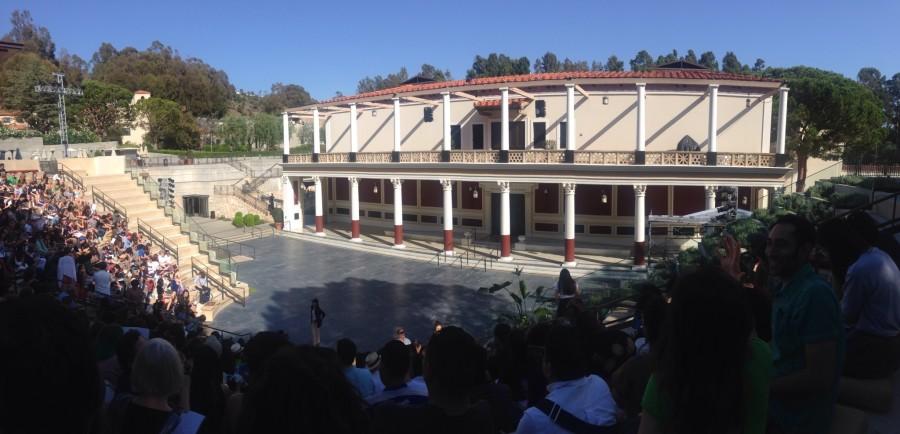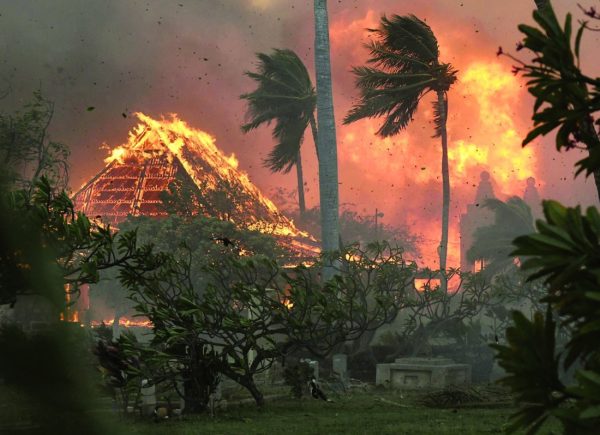Medea at the Getty Villa Tackles Pertinent Issues
December 14, 2015
On September 23rd, led by Dr. Menard and a few other faculty members, 38 students from AP Art History, Art History A and AP English Literature enjoyed an afternoon performance of Mojada: A Medea in Los Angeles at the Getty Villa Outdoor Classical Theatre, located right off the Pacific Coast Highway.
Each fall, the Getty Villa features a classical tragedy or comedy in the Barbara and Lawrence Fleischman Theater, a beautiful outdoor venue modeled after ancient Greek and Roman theaters; this fall marked the 8th year that Dr. Menard has taken girls to see these shows.
As a classical archaeologist, Dr. Menard is friends with many of the curators at the Getty Villa and is best friends with the scholar who runs the program, Dr. Shelby Brown. As a result, Marymount girls are able to partake in this unique Los Angeles experience normally tailored for college-level theater majors.
“I had been to the Villa as a kid but I hadn’t been back in awhile, so this gave me the perfect opportunity to visit. The first thing I noticed when we arrived was the atmosphere—I loved it. All these high school and college students were gathered at the Villa to see Medea, and it was amazing to be a part of that, a part of this greater community,” says senior Kaitlyn Greta.
A Greek tragedy by Euripides, Medea takes place in 431 B.C., a heavily male-dominated era. It focuses on protagonist Medea’s bloody revenge plan, a reaction to her husband Jason leaving her to marry the younger, wealthier princess of Corinth, and Creon, the King of Corinth, banishing her and her two sons.
Medea’s initiative and arguably radical actions were met with heavy disapproval during Euripides’s time, and Medea was unpopular. Today, however, Medea is seen as a feminist hero, and Medea is a celebrated literary work praised for its exploration of significant themes—feminism, betrayal, love, sacrifice and foreignness, to name a few.
Luis Alfaro’s Mojada puts a modern twist to this classic while exploring the same themes. Set in modern day East Los Angeles, it follows the journey of Medea, her husband Jason (pronounced “Hason” in the play) and their son through the perilous Mexican border crossing and the struggles they face as they fight to survive in a country where the harsh realities don’t align with their grand hopes for the American Dream. As Medea’s old and new worlds collide, Alfaro beautifully integrates the ever so relevant problems faced by today’s immigrants.
The event not only consisted of the extraordinary show but also an exclusive Q&A session with the actors as well as an hour to roam the Getty Villa museum, left open just for the student audience.
Dr. Menard says that actors and Getty personnel comment year after year about the “girls in uniform” who ask the best questions.
“The preparation on our end is solid—both the history and the language—so the experience on the student end is multi-leveled. I’m so proud that all the students not only saw all the complexities and layers, but also knew how to articulate these complexities. You guys were brilliant,” says Dr. Menard.
Overall, of the 8 other productions, Medea entailed the greatest reaction in girls mainly because it is a female play; students are more sensitive to these issues.
The all-female environment at Marymount causes us to be more conscious of the varying levels of interpretation that arise from such a multi-layered production. It brings a relevant notion into our minds: we try not to be iconic rampant, radical feminists, but powerful women who understand the pitfalls women still face today and, accordingly, balance our goals with realism and deliberation.













